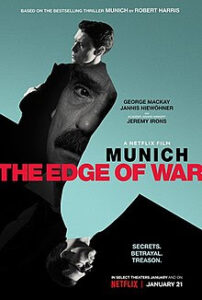Munich, The Edge of War

Directed by Christian Schwochow
Based on the book Munich, by Robert Harris
Starring George MacKay, Jannis Niewöhner, Jeremy Irons, and Sandra Hüller
Released in 2021
Currently streaming on Netflix
Watch Time: 2 hrs, 11 min
Someone had recommended it to K. I liked the title. We sat in the den, dishes of spaghetti and glasses of a red blend by Prisoner, a brand I can recommend, and hit the Play button.
Munich: The Edge of War is a spy thriller. And a good one, I thought. But it is also an account of England’s diplomatic relationship with Hitler in the years just before WWII.
The main characters are fictionalized, but the story is largely factual. It is true that Chamberlain did take the view that by giving some concessions to Hitler, he could keep England out of the war. It is also true that Chamberlain went to Munich and signed an agreement that England would do nothing against Germany, so long as Hitler promised to cease his planned invasion of Czechoslovakia, which Hitler agreed to and then reneged on.
What I Liked About It
The plot is tight. The mood is tense. It takes place in 1932, when we meet the main characters, Hugh Legat and his German friends Paul von Hartman and Paul’s girlfriend Lena, at a party celebrating their graduation from Oxford University.
It jumps from there to 1938. Legat is working as the private secretary of Neville Chamberlain, the British Prime Minister. Germany has invaded Poland and it’s clear to many that he aims to conquer all of Europe. But Chamberlain is part of a considerable contingency of political leaders and Englishmen that believe Britain can – and maybe should – avoid getting into a war with Germany.
Hitler convinces Chamberlain to come to a meeting in Munich to work out a deal (The Munich Agreement) whereby England will allow Germany to seize control of Sudetenland from Czechoslovakia.
Meanwhile, his old friend Hartman, who was a Nazi supporter when the two were in university, is now working days as a translator in Berlin for the German Ministry of Foreign Affairs and nights plotting to overthrow Hitler, who, he thinks, will destroy the Germany that he loves.
What I Also Liked About It
As regular readers know, I’ve been doing a lot of research on the Arab/Israeli conflict and the Israel/Hamas war. One thing I’ve learned that is indisputable is that the history of Palestine since the end of WWII is the history of Arab terrorists in Palestine attempting to commit genocide against Israel – and then, when Israel defended itself successfully, those same Arab and Palestinian leaders (some of whom had direct ties with Hitler during the war) asking England and the US to arrange peace between them so they could find a “two state” solution. And each time they achieved a cease fire, they immediately attacked Israel again.
It’s impossible to watch this movie without noticing the similarity with what has been going on since England engineered the famous Partition Agreement in 1947. It boils down to the question of whether it is possible to believe that someone or some group of people committed to genocide can be trusted. Hitler proved to Chamberlain and the rest of the world that he could not be trusted. It makes me wonder why so many US presidents, and now so many Americans, believe that the leaders of Hamas and Hezbollah can be trusted today.
Critical Reception
As I said above, I thought this was a very good movie – easily as good as all the movies that were nominated for this year’s Academy Award. So I was surprised to discover that the critical reception of Munich: The Edge of War was mixed, at best. A few examples:
* “A plodding bureaucratic procedural that features many, many characters strategizing in various spaces with furrowed brows and clenched jaws, mostly in relentless medium close-up.” (New York Times)
* “Once various ducks have been gotten in a narrative row and the conference starts, the movie becomes pretty good.” (Boston Globe)
* “A mixture of well-researched historical fact and pure fiction, Munich: The Edge of War is a smart and entertaining thriller that suffers from just one thing: We all know how it ends.” (Washington Post)
You can watch the trailer here.
